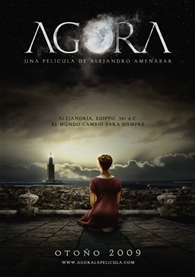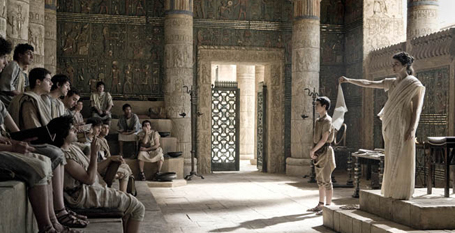
Agora is an account of the historical tragedies that took place in the city of Alexandria within a short span of 20 years, a visual spectacle of a society going to hell in a breadbasket. We get to witness the (second) destruction of the Library of Alexandria, the pogrom and expulsion of its Jewish population, and most importantly, the martyrdom of Neoplatonist (i.e. agnostic) scientist and philosopher Hypatia at the hands of a mob of Christians which marks the end of the Classical age of antiquity.
This movie, like 300 and other classic epics, features a battle that cannot be won, and yet is fought to its very bloody end. On one side, the ill-fated scientist and mathematician Hypatia. On the other, St Cyril of Alexandria, whose political leadership of the city’s fanatical and violent Christians (and Machiavellian manoeuvring against other Christian factions) has cast a shadow of his reputation as a brilliant theologian.
The Spaniard gay director has a firm grasp of cinema and storytelling that turns a historical footnote into a gripping drama. In his hands, the premise of an genre of period films (like the religiously triumphalist and morally uplifting Quo Vadis) is turned on its head. Both the historical record and this movie attempt to show just how life didn’t become peachy keen in the Roman Empire even after Charlton Heston accepted the Lord in Ben Hur. The cheesemakers are not blessed in Alexandria, even with the Christianisation of the Empire. In fact, very much the opposite.
The slow motion collapse of Alexandrian society and its cascading series of minor tragedies unfold in lavish sets and is orchestrated to authentic period music, illuminated by an orgy of violence and gore, and punctuated by Alejandro Amenabar’s full-blooded call to arms against religious extremism.












 Printable Version
Printable Version










Reader's Comments
kinda make me really sad and mad.
why nobody like peace already?
why they do not respect others?
but if you want to blame, it is the agonist who started the fight first.
but i also do not like those christian becasue they are naive and believe what is been told.
that is why the slave did realise he had been doing the wrong thing in freeing himself in slavehood.
I really sad when the camera pull away from Alexandia further to space.
We are so small in the universe but yet we can not tollerate anything.
When a religion could not bring peace, then it is better not to have religion becasue in that way, we could just blame the human.
Please log in to use this feature.